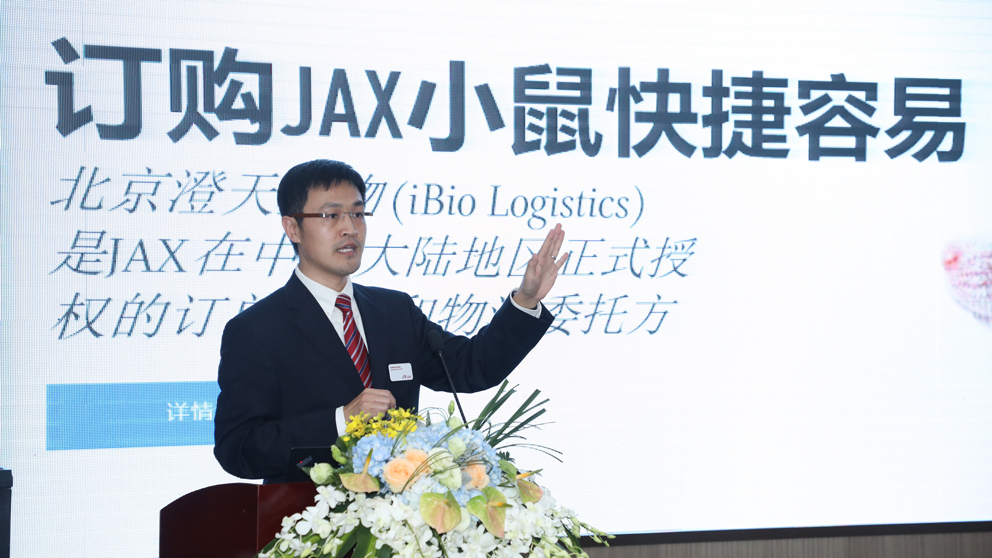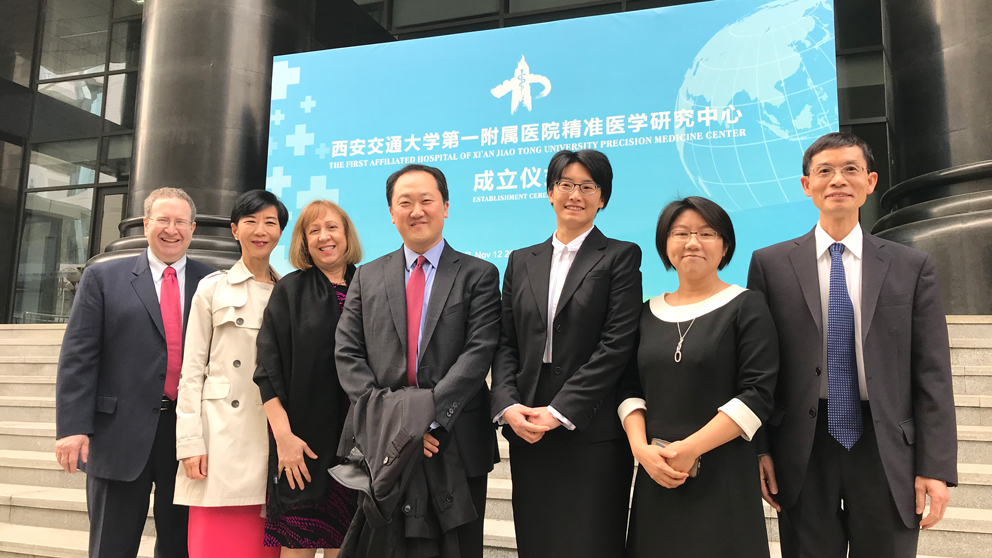Farmington, Conn, U.S.A., Beijing, Shanghai and Xi’ian PRC — The Jackson Laboratory (JAX), a U.S.-based nonprofit biomedical research institution, announced several key milestones in China that will help to empower the Chinese biomedical research community. This expansion is in line with the Laboratory’s mission: To discover precise genomic solutions for disease and empower the global biomedical community in the shared quest to improve human health.

Xuefeng Zhang of The Jackson Laboratory presents at a seminar in Shanghai.
The Jackson Laboratory brings top quality research models to China
The Jackson Laboratory is establishing a dedicated quarantine facility for the importation of JAX® Mice into China. The National Institute of Biological Sciences in Beijing will provide these quarantine services solely for The Jackson Laboratory. The Jackson Laboratory is also authorizing iBio Logistics for order fulfillment and transportation of its mice in mainland China. As part of this role, iBio Logistics will provide Mandarin-speaking customer support, quotation, order placement and delivery on behalf of The Jackson Laboratory.
“With these efforts, The Jackson Laboratory is increasing access for academic and drug discovery scientists in China to premium quality research mouse models with the goal of helping the research community generate impactful discoveries using mouse models of the highest quality and health standards in the world,” said , executive vice president of The Jackson Laboratory and president, JAX® Mice, Clinical and Research Services. “The Jackson Laboratory will achieve this goal through having complete assurance and control of the entire supply chain of JAX® Mice, from production in the U.S. to arrival at clients’ sites in China, thereby ensuring quality and timeliness.
Additionally, The Jackson Laboratory, Shanghai in the Zhangjiang Hi-tech Research Park in Pudong, has been established for the purposes of researcher support and knowledge sharing. “The new physical presence and employees based out of Shanghai will allow us to better empower scientific researchers in China. This will be accomplished through improved access to mouse models and sharing of scientific insights to accelerate biological discovery and drug development,” said Nair.
In addition to providing improved access to the 11,500+ strains of JAX® Mice, The Jackson Laboratory announces that the JAX® NSG ™ portfolio will be widely available. This includes 22 highly immunodeficient and humanized mouse models, which are globally regarded as the premium models for cancer, stem cell biology, humanized mice, and infectious disease research.
As part of its education mission, The Jackson Laboratory is hosting a Preclinical Mouse Models Forum on November 12 in Hong Kong, November 14 in Shanghai, and November 16 in Beijing. Discussion topics relevant for academic and drug discovery scientists will include:
- Selection and use of immunodeficient mice
- Preclinical research applications using NSGTM and humanized mice
- Models and services for drug development
“Through our symposia in Hong Kong, Shanghai and Beijing we are pleased to extend direct access for researchers to increase their understanding of the utility of our specialized mouse models and the importance of genetic stability and high health status,” said Nair. “Sharing what we’ve learned in this space is of the utmost importance as part of our educational commitments as a nonprofit research institute.”

Jackson Laboratory employees recently visited The First Affiliated Hospital of Xi’an Jiaotong University in Xi'an, China. Pictured here, from left, are Ken Fasman, Senior Vice President for Research; Yu-Hui Rogers, Senior Director, Research Strategy, Asia Research; Catherine Longley, Executive Vice President and Chief Operating Officer; Charles Lee, Scientific Director of JAX Genomic Medicine; Wan-ping Lee, Computational Scientist; Chun-Ti Chen, Research Scientist; and CZ Zhang, Director, Cytogenics Laboratory in the Lee lab.
Charles Lee’s research collaboration in China
The Jackson Laboratory also announced that Charles Lee, Ph.D., FACMGThe study of structural genomic variation in human biology, evolution and disease.Dr. Charles Lee , scientific director of The Jackson Laboratory for Genomic Medicine, will be collaborating with Dr. Kai Ye of the Xi’an Jiaotong University (XJTU) and the First Affiliated Hospital of Xi’an Jiaotong University (XJTU1AH). Lee has been appointed an adjunct professor and is co-leading the establishment of a precision medicine initiative at the First Affiliated Hospital of Xi’an Jiaotong University, a comprehensive level-three class-A hospital in Northwest China, under the supervision of the National Health and Family Planning Commission. It is one of the select hospitals honored with the level-three class-A rank in China, and has been one of the first national "One Hundred Exemplary Hospitals." Lee will establish a program with XJTU researchers and XJTU1AH physicians and staff, and will explore opportunities for more expanded collaboration between the institutions.
His research program will have translational significance: Using his expertise in genomic structural variation to advance an understanding of the complex genomic structures and variants, and gene networks, and also uncover the genomic basis of diseases. Some of the most advanced genetic and cell engineering technologies will subsequently be used to develop novel therapies for treating human diseases. He will also utilize The Jackson Laboratory’s PDX platform to evaluate cancer therapy options and enhance our understanding of anti-cancer drug resistance in patients.
“I am looking forward to collaborating with Dr. Kai Ye and his team and colleagues at XJTU1AH and XJTUs to develop and implement critical tools for clinicians in Xi’an, China to help them make more accurate diagnoses of genetic tests as well as accelerate the development and translation of precision medicine solutions for treating human diseases,” said Lee.
To learn more about The Jackson Laboratory’s presence in China, please visit www.jax.org/cn.
About The Jackson Laboratory
The Jackson Laboratory (www.jax.org) is an independent, nonprofit biomedical research institution with more than 2,200 employees. With a mammalian genetics institute as its headquarters campus in Bar Harbor, Maine, it has a genomic medicine institute in Farmington, Conn., JAX® Mice and Clinical Research Services facilities in Sacramento, Calif. and Ellsworth, Maine. The Laboratory's mission is to discover precise genomic solutions for disease and empower the global biomedical community in the shared quest to improve human health.
Founded in 1929, the Laboratory applies its nine decades of expertise in genetics to increase understanding of human disease, advancing treatments and cures for cancer, neurological and immune disorders, diabetes, aging and heart disease. It models and interprets genomic complexity, integrates basic research with clinical application, educates current and future scientists, and empowers the global biomedical community by providing critical data, tools and services. The Laboratory has a National Cancer Institute-designated Cancer Center as well as National Institutes of Health-funded research centers for aging, Alzheimer’s disease, precision genetics and addiction.
The Laboratory is the world's source for more than 11,500 strains of genetically defined mice, is home of the Mouse Genome Informatics and Mouse Phenome databases, and is a hub for scientific courses, conferences, training and education.